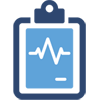Neurology is a medical science that deals with the physiology and diseases of the nervous system. The nervous system consists of the brain, spinal cord (spinal cord) and peripheral nervous system. The treatment of diseases that develop in any of these three departments and do not require surgical intervention is carried out by the neurology department. In our neurology department, intensive care services are provided by our specialists in the follow-up of diseases requiring intensive care, as well as outpatient and inpatient treatment services.
WHAT DISEASES DOES NEUROLOGY LOOK AT?
Cerebrovascular Diseases: Cerebral vascular diseases include cerebral hemorrhages and cerebral vascular blockages within the scope of cerebrovascular diseases. Stroke, as it is popularly called, paralysis occurs when one of the cerebral vessels is blocked and that area of the brain cannot be fed, and it can manifest itself in the form of various neurological tables. Decapitation is caused by a blockage of one of the brain vessels and an inability to feed that area of the brain. Cell death occurs in the areas fed by the blocked vessel, and depending on the region, loss of strength, loss of speech, dizziness, visual disturbances and loss of consciousness may occur on one side of the body. Neurology specialists detect the blocked vessel and the affected area using Magnetic Resonance Imaging (MRI) or Computed Tomography (CT) examinations and arrange the treatment. In addition to vascular Decongestion, cerebral hemorrhages due to blood pressure, venous hemorrhages due to blockages of the veins are also included among the cerebral vascular diseases. Monitoring and treatment of brain hemorrhages that do not require surgical evacuation are also performed by neurology specialists. Patients who develop loss of consciousness and require respiratory or cardiac support are treated in the intensive care unit, while patients who do not require intensive care support are treated in the clinic.
Epilepsy: Epilepsy disease, popularly known as Sara crisis or seizure Decapitation, is among the diseases monitored by the neurology unit. Decapitation is one of the most common epileptic disorders in the world. The most common seizure type of epilepsy is generalized tonic-clonic seizures, which occur with involuntary movements in the arms and legs, loss of consciousness, foaming at the mouth, urinary incontinence. The examination method used primarily for the follow-up and treatment of epilepsy is EEG. Epilepsy can start in childhood, and it can occur in adulthood, although rarely. In seizures that occur in adulthood, a person should definitely consult a neurology specialist and perform the necessary examinations. The examinations that should be performed first are MRI and EEG. Epilepsy treatment is performed by neurology specialists with antiepileptic drugs. There is an adult EEG in our hospital.
Headache: Headache is one of the most common complaints in our society. Among the types of headaches, migraine or tension-type headaches are the most common. Dec. The diagnosis is made according to the patient’s complaints, the type of headache. The diagnosis and treatment of headache is carried out by the neurology unit. Usually, the treatment of patients is arranged according to the medical history or by applying imaging methods such as MRI or CT if deemed necessary by a neurology specialist.
Dementia (Dementia): Although depression is the most common cause of forgetfulness complaints seen at a young age, the incidence of dementia in society is increasing due to the prolongation of human life. The most common cause of dementia seen at an advanced age is Alzheimer’s disease. Complaints that start with forgetfulness progress with complaints such as decreased cognitive activity, thinking disorders, difficulty doing daily activities, refusal to eat, withdrawal. In addition to Alzheimer’s disease, dementia may also occur due to disorders in the structure of the cerebral vessels. The follow-up and treatment of these diseases are carried out by neurology specialists.
Movement Disorders: Movement disorders include diseases such as dystonia, essential tremor, dyskinesias, restless legs syndrome, most often Parkinson’s disease. The diagnosis and treatment of Parkinson’s disease, which is characterized by tremors in the hands, involuntary movements, loss of facial expression, gait disorders, is performed by the neurology unit. Apart from Parkinson’s disease, if you have complaints such as trembling in the hands, swinging like a pendulum at first, involuntary movements in the legs that occur at night, burning, you can get rid of your complaints by contacting neurology units in the light of the necessary treatments.
Sleep Disorders: Along with increasing sources of stress, sleep disorders have become one of the most common health problems today. Pathologies such as snoring, sleep apnea (shortness of breath during sleep) can disrupt the quality of your sleep at night, causing insufficient sleep intake and a constant feeling of fatigue. If you have a complaint of snoring or sleep apnea noticed by your relatives, or if you are having difficulty falling asleep or think that you are oversleeping, you should come to the neurology department.
Demyelinating diseases: Myelin is an insulating substance that covers the sheath nerve cells and is essential for the nervous system to maintain its function. Depending on the loss of this substance, various neurological findings occur according to the functions of the nerve cells in which the loss develops. The most common demyelinating disease is Multiple Sclerosis (MS) disease. MS watches in episodes. After attacks, complaints may decrease, disappear, or permanent damage may develop. The diagnosis of an attack is made by the presence of plaques holding contrast media monitored on MRI in addition to newly emerging neurological damages in the patient. October. In addition to the treatment of attacks, there are various preventive treatment options that will prevent patients from having an attack. MS is a chronic disease and its monitoring and treatment are carried out by neurologists. In addition to MS, there are other rare demyelinating diseases such as neuromyelitis optica (NMO), Device disease.
November Dec Nov 2019 Muscle Diseases: The most common autoimmune disease among muscle diseases is Myasthenia Graves, and the most common genetically transmitted disease is Duchenne Muscular Dystrophy. nov 2019 Myasthenia Gravis. nov 2019 Myasthenia Gravis. nov 2019 Myasthenia Gravis. November 2019 Myasthenia Gravis. November November, November November, November 2018, is a rare disease in which muscle thinning, muscle mass loss and muscle contraction disorders are observed due to the disorders in nerve-muscle transmission in these diseases. November Myasthenia Gravis most often involves the eye muscles. Eyel November fall, visual disturbances due to weakness in the eye muscles and double vision, chewing and swallowing difficulties and in advanced periods, arm and leg muscles are observed to weaken. novemberjust novemberjust novemberjust novemberjust novemberjust novemberjust novemberjust novemberjust November 1995. The diagnosis and treatment of these diseases are also carried out by the neurology department.
In addition to these diseases, diagnoses and treatments of diseases such as vertigo (dizziness), facial paralysis, facial pains, nerve damage due to diabetes (diabetic polyneuropathy) are also performed by the neurology department.
WHAT ARE THE MAIN TESTS PERFORMED IN THE NEUROLOGY DEPARTMENT?
Neurology physicians are interested in the diagnosis, follow-up and treatment of a fairly wide group of diseases that concern all parts of the nervous system and November-November diseases. In the diagnosis and follow-up of these diseases, examinations and imaging methods that measure neural messages are applied. Some of the examinations performed in neurology clinics in our hospitals are as follows:
• EEG (Large): The EEG test used in the diagnosis and follow-up of epilepsy and some other diseases can be applied to adults in our hospital.
* November (Dec): The connections between nerve-nerve, nerve-muscle are made by electrical conduction. November Deceleration Electromyelography (EMG) test is an electrophysiological test that serves to measure disorders in the connections between nerves and nerves-muscles and is applied by neurology specialists. November 2019, the most commonly used areas are trap neuropathies such as Carpal Tunnel Syndrome, demonstration of nerve damage in lumbar and neck hernias, demonstration of nerve-muscle conduction disorders in muscle diseases, facial paralysis, diaebete-related polyneuropathy, diagnosis and treatment of motor neurone diseases such as ALS or Guillain Barre. November 2019, diagnosis and treatment of motor neurone diseases such as ALS or Guillain Barre. It is necessary to undergo long-term training in order to apply EMG, which is a very complex test.
*Evoked Potentials: Tests such as SSEP (Somatosensory Evoked Potential), VEP (Visual Evoked Potential), BERA (Auditory Evoked Potential) used in the diagnosis of certain diseases are performed by measuring the response of the nervous system to electrical current given from certain regions.

